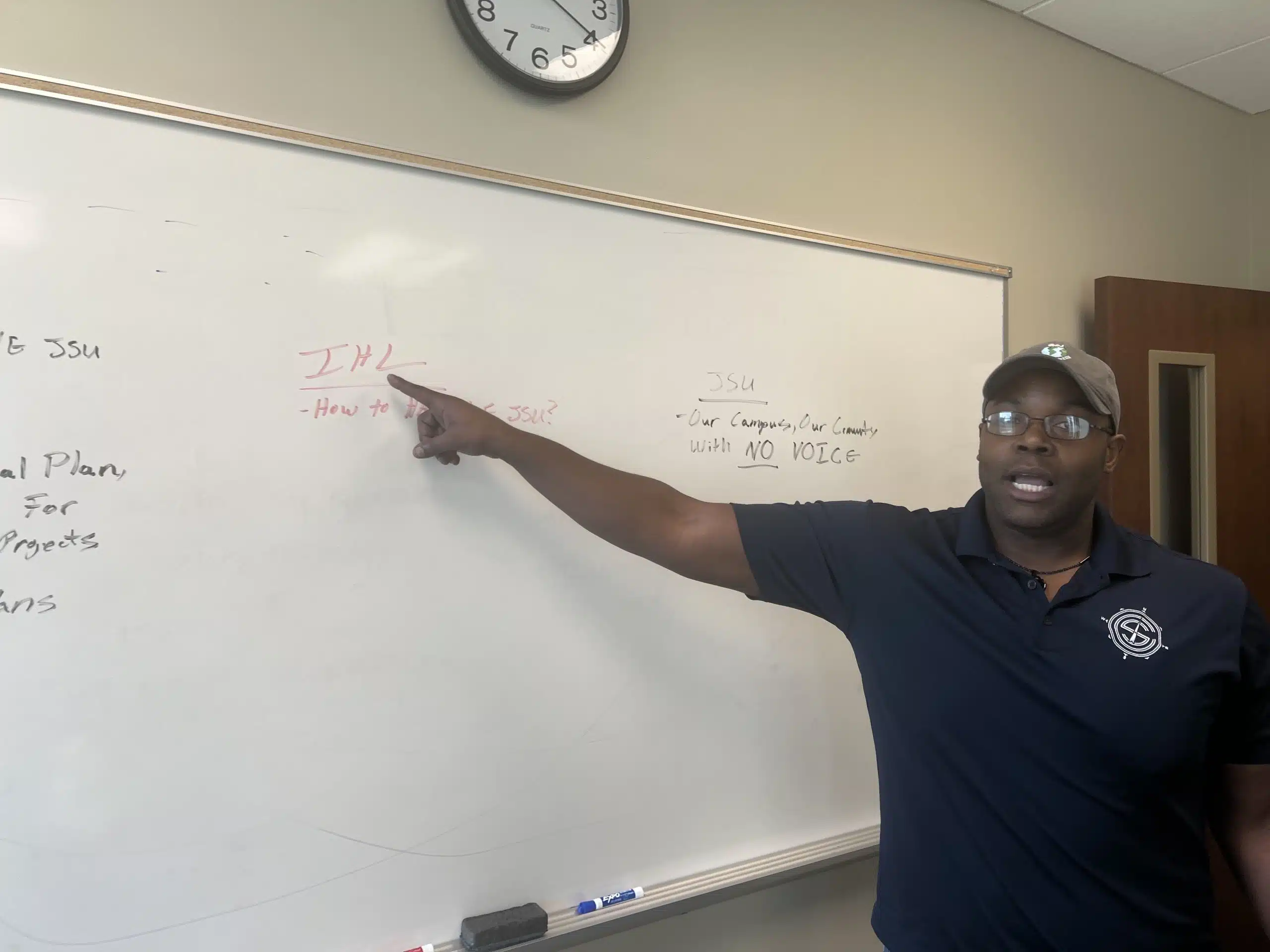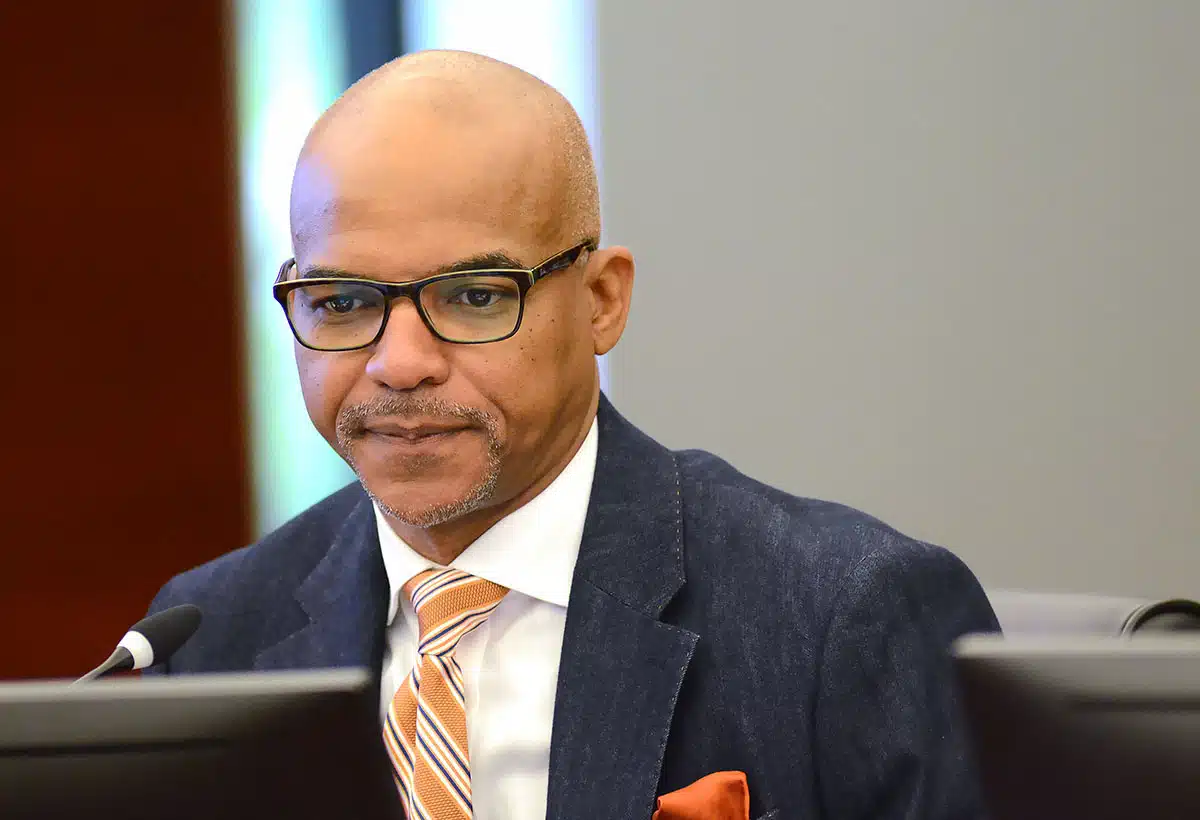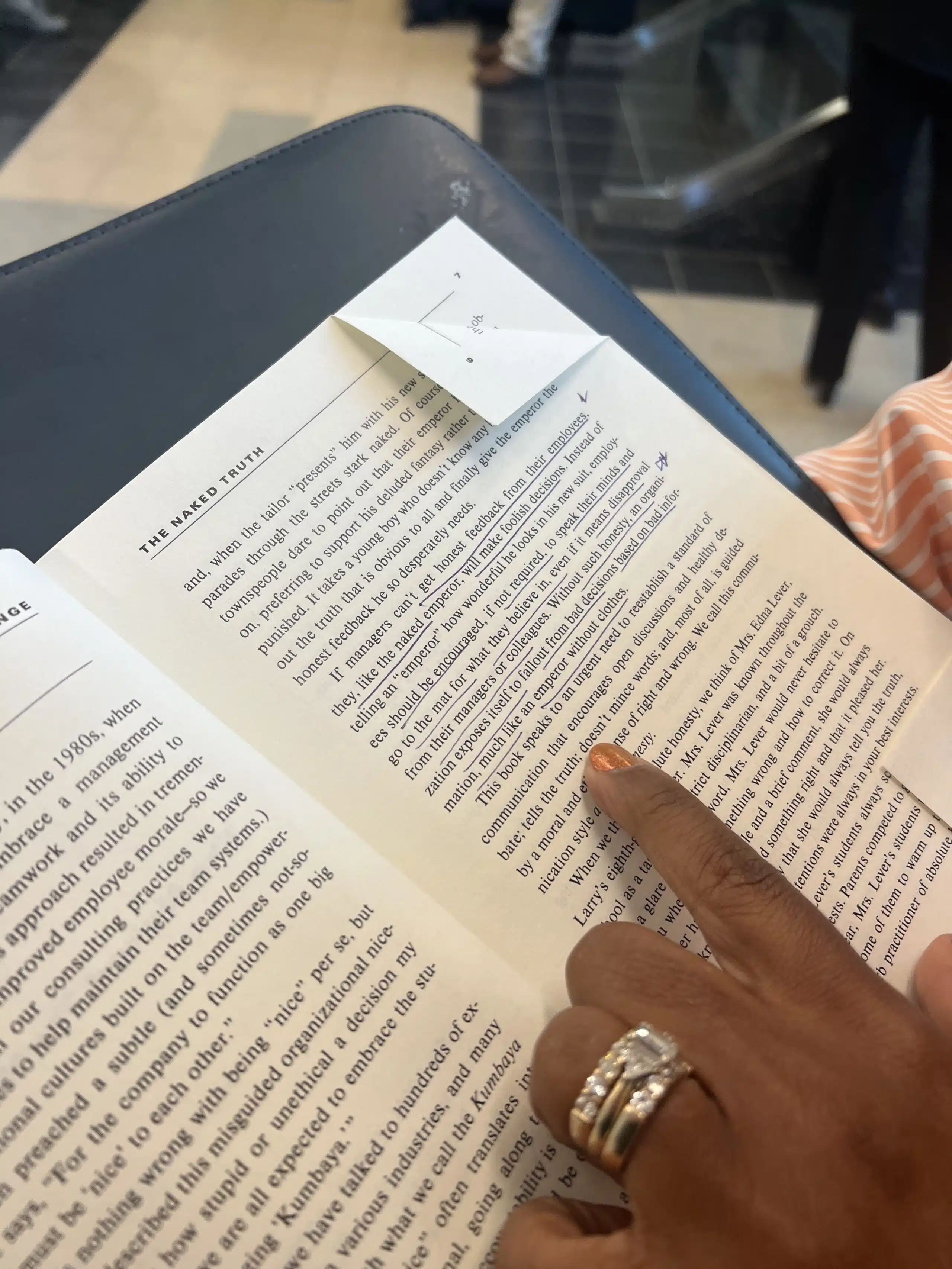Mississippi Today
JSU waits for news from IHL as trustees interview finalists behind locked doors

William Brown and Millard Bingham, standing with their arms crossed, are waiting in a hallway of classrooms for the executive session to end, hoping it’ll bring some information about who is going to be the next president of Jackson State University.
But Brown and Bingham know it probably won’t. At least not today.
The two professors have waited many times before. In their two decades of teaching at Jackson State, they’ve seen four permanent presidents come and go from the historically Black university. And each time, they’ve watched as the search process used by the university’s governing board, the Institutions of Higher Learning Board of Trustees, has become more and more secretive — to the point that now, transparency “just seems like an unattainable dream,” Bingham said.
“It feels like the fix is in, to be honest with you,” he added.
“Well, I can tell you that God is not pleased,” Brown stated. “It’s sort of like we’re in the dark ages.”
One thing is certain: Acting president Elayne Hayes-Anthony is not a finalist for the position, she confirmed to Mississippi Today.

About an hour earlier, at 8:30 a.m., with two sharp bursts of a gavel, Steven Cunningham, the only Jackson State alumnus on the IHL board and the trustee chairing the search, brought the special-called meeting to order in a small conference room packed with people at the University of Mississippi’s School of Pharmacy, a few miles away from the board’s usual meeting place.
Sitting at the table with Cunningham were two other trustees, the commissioner and William Kibler, a consultant for Academic Search, the executive headhunting firm that IHL had contracted, who had a white binder closed in front of him.
“Thank you trustees for taking the time to participate in this very important meeting,” Cunningham said, reading a printed statement.
Then he made a motion for executive session, which passed.
“If you’re not an IHL trustee, you’re welcome to wait in the lobby or in one of the classrooms in the adjacent hallway,” Cunningham read.
With that, about 15 members of the public were shepherded from the room as seven security guards watched. Uncomfortable with the guards, some people left.
Behind them, Glynn Babb, an emergency and safety officer for IHL, and a UMMC security guard shut the conference room door and, for good measure, automatically locked the double-doors that lead to the hallway, the windows taped-up with paper.
“So they don’t get pictures of them coming in and out,” Babb told the guard before requesting members of the public to move away from the doors.
“It’s the secrecy,” he tells a reporter. “Not really protection.”
“Glynn’s not authorized,” interjected Kim Gallaspy, a spokesperson for IHL.
A few feet away, Dawn McLin, a Jackson State professor and the faculty senate president, stood off to the side. She had come hoping to ask Cunningham and the IHL commissioner, Al Rankins, a few questions. Namely, she wanted to know why they had not responded to her repeated emails asking for basic information about the presidential search, such as a rough timeline, which she did not see until Mississippi Today published it.
Even though she was a member of IHL’s search advisory committee, IHL had not provided McLin with any notable information about the search.
But they had asked her and other advisory committee members not to talk to the media.
“They said we should all be speaking in one voice, but it’s concerning when that one voice isn’t giving all of us information about the search process,” she said.

If there were one thing she could tell IHL, McLin said, it would be in line with the title of a book about corporate management called “Absolute Honesty” that, if given the opportunity to comment, she had planned to read.
She had also hoped to express her support for Hayes-Anthony.
“This feels like we have a pilot that you all put on this seat to fly this plane and now halfway to our destination you’ve told this pilot to eject,” she said. “What measures are you putting in place for those on the plane to keep us from crashing? You’re getting some stability but it’s like everyone has to hold their breath. You know you can’t hold your breath waiting forever.”
Without more transparency, McLin said she feels like IHL is setting up the next president of Jackson State for failure. She doesn’t want a repeat of William Bynum Jr., whom IHL appointed president even though he was not initially a finalist, or Thomas Hudson, who resigned for reasons that still have not been shared with the public. Bynum, who was hired from Mississippi Valley State University, resigned in 2020 after he was arrested in a prostitution sting.
“Their past appointments have shown you their results,” she said. “The proof is in the pudding.”
Other attendees were just as disappointed. Monica Wilson, a Jackson State graduate, thought she’d pop over to the meeting because she works in Human Resources at UMMC — but she was quickly disabused of that notion.
“My surprise was it was such a small room,” she said. “I’m not even in the room. I’m at the door looking in. That told me this is not going to be for the public.”
By the time Nike Irving and her husband, Shelton Pittman, had arrived at the meeting around 8:45 a.m., the trustees were already in executive session. They had rushed over after dropping their son off at school. But when they arrived, security guards directed them to a classroom down the hall. Irving, who has a master’s degree from Jackson State, expected one of the TVs to turn on with a broadcast of the meeting.
But it never did.
“I just want to know what they plan to do for the university,” Irving said.
On a whiteboard, Pittman, a military veteran who graduated from the University of Southern Mississippi, wrote out his thoughts on IHL’s search process, which he referred to as “foolishness.”
“At this particular moment,” Pittman said, “I don’t think IHL nor the kids and young adults can withstand—”
“Another person quitting on them,” Irving concluded.
When they left, the doors to the School of Pharmacy building locked behind them.
Five-and-half hours after closing the doors, trustees emerged. Cunningham said they took no action.
Cunningham couldn’t say if every finalist has a doctoral degree — which the search profile stated was preferred but not required — and wouldn’t say how many finalist there were. He added that he didn’t know how the community was coming up with rumors.
“Nature abhors a vacuum,” he said.
This article first appeared on Mississippi Today and is republished here under a Creative Commons license.
Mississippi Today
Hospitals see danger in Medicaid spending cuts
Mississippi hospitals could lose up to $1 billion over the next decade under the sweeping, multitrillion-dollar tax and policy bill President Donald Trump signed into law last week, according to leaders at the Mississippi Hospital Association.
The leaders say the cuts could force some already-struggling rural hospitals to reduce services or close their doors.
The law includes the largest reduction in federal health and social safety net programs in history. It passed 218-214, with all Democrats voting against the measure and all but five Republicans voting for it.
In the short term, these cuts will make health care less accessible to poor Mississippians by making the eligibility requirements for Medicaid insurance stiffer, likely increasing people’s medical debt.
In the long run, the cuts could lead to worsening chronic health conditions such as diabetes and obesity for which Mississippi already leads the nation, and making private insurance more expensive for many people, experts say.
“We’ve got about a billion dollars that are potentially hanging in the balance over the next 10 years,” Mississippi Hospital Association President Richard Roberson said Wednesday during a panel discussion at his organization’s headquarters.
“If folks were being honest, the entire system depends on those rural hospitals,” he said.
Mississippi’s uninsured population could increase by 160,000 people as a combined result of the new law and the expiration of Biden-era enhanced subsidies that made marketplace insurance affordable – and which Trump is not expected to renew – according to KFF, a health policy research group.
That could make things even worse for those who are left on the marketplace plans.
“Younger, healthier people are going to leave the risk pool, and that’s going to mean it’s more expensive to insure the patients that remain,” said Lucy Dagneau, senior director of state and local campaigns at the American Cancer Society.
Among the biggest changes facing Medicaid-eligible patients are stiffer eligibility requirements, including proof of work. The new law requires able-bodied adults ages 19 to 64 to work, do community service or attend an educational program at least 80 hours a month to qualify for, or keep, Medicaid coverage and federal food aid.
Opponents say qualified recipients could be stripped of benefits if they lose a job or fail to complete paperwork attesting to their time commitment.
Georgia became the case study for work requirements with a program called Pathways to Coverage, which was touted as a conservative alternative to Medicaid expansion.
Ironically, the 54-year-old mechanic chosen by Georgia Gov. Brian Kemp to be the face of the program got so fed up with the work requirements he went from praising the program on television to saying “I’m done with it” after his benefits were allegedly cancelled twice due to red tape.
Roberson sent several letters to Mississippi’s congressional members in weeks leading up to the final vote on the sweeping federal legislation, sounding the alarm on what it would mean for hospitals and patients.
Among Roberson’s chief concerns is a change in the mechanism called state directed payments, which allows states to beef up Medicaid reimbursement rates – typically the lowest among insurance payors. The new law will reduce those enhanced rates to nearly as low as the Medicare rate, costing the state at least $500 million and putting rural hospitals in a bind, Roberson told Mississippi Today.
That change will happen over 10 years starting in 2028. That, in conjunction with the new law’s one-time payment program called the Rural Health Care Fund, means if the next few years look normal, it doesn’t mean Mississippi is safe, stakeholders warn.
“We’re going to have a sort of deceiving situation in Mississippi where we look a little flush with cash with the rural fund and the state directed payments in 2027 and 2028, and then all of a sudden our state directed payments start going down and that fund ends and then we’re going to start dipping,” said Leah Rupp Smith, vice president for policy and advocacy at the Mississippi Hospital Association.

Even with that buffer time, immediate changes are on the horizon for health care in Mississippi because of fear and uncertainty around ever-changing rules.
“Hospitals can’t budget when we have these one-off programs that start and stop and the rules change – and there’s a cost to administering a program like this,” Smith said.
Since hospitals are major employers – and they also provide a sense of safety for incoming businesses – their closure, especially in rural areas, affects not just patients but local economies and communities.
U.S. Rep. Bennie Thompson is the only Democrat in Mississippi’s congressional delegation. He voted against the bill, while the state’s two Republican senators and three Republican House members voted for it. Thompson said in a statement that the new law does not bode well for the Delta, one of the poorest regions in the U.S.
“For my district, this means closed hospitals, nursing homes, families struggling to afford groceries, and educational opportunities deferred,” Thompson said. “Republicans’ priorities are very simple: tax cuts for (the) wealthy and nothing for the people who make this country work.”
While still colloquially referred to as the One Big Beautiful Bill Act, the name was changed by Democrats invoking a maneuver that has been used by lawmakers in both chambers to oppose a bill on principle.
“Democrats are forcing Republicans to delete their farcical bill name,” Senate Democratic Leader Charles Schumer of New York said in a statement. “Nothing about this bill is beautiful — it’s a betrayal to American families and it’s undeserving of such a stupid name.”
The law is expected to add at least $3.3 trillion to the nation’s debt over the next 10 years, according to the most recent estimate from the Congressional Budget Office.
This article first appeared on Mississippi Today and is republished here under a Creative Commons Attribution-NoDerivatives 4.0 International License.
The post Hospitals see danger in Medicaid spending cuts appeared first on mississippitoday.org
Note: The following A.I. based commentary is not part of the original article, reproduced above, but is offered in the hopes that it will promote greater media literacy and critical thinking, by making any potential bias more visible to the reader –Staff Editor.
Political Bias Rating: Center-Left
This article reports on the negative impacts of a major federal tax and policy bill on Medicaid funding and rural hospitals in Mississippi. While it presents factual details and statements from stakeholders, the tone and framing emphasize the harmful consequences for vulnerable populations and health care access, aligning with concerns typically raised by center-left perspectives. The article highlights opposition by Democrats and critiques the bill’s priorities, particularly its effect on poor and rural communities, suggesting sympathy toward social safety net preservation. However, it maintains mostly factual reporting without overt partisan language, resulting in a moderate center-left bias.
Crooked Letter Sports Podcast
Podcast: The Mississippi Sports Hall of Fame Class of ’25
The MSHOF will induct eight new members on Aug 2. Rick Cleveland has covered them all and he and son Tyler talk about what makes them all special.
Stream all episodes here.
This article first appeared on Mississippi Today and is republished here under a Creative Commons Attribution-NoDerivatives 4.0 International License.
The post Podcast: The Mississippi Sports Hall of Fame Class of '25 appeared first on mississippitoday.org
Mississippi Today
‘You’re not going to be able to do that anymore’: Jackson police chief visits food kitchen to discuss new public sleeping, panhandling laws
Diners turned watchful eyes to the stage as Jackson Police Chief Joseph Wade took to the podium. He visited Stewpot Community Services during its daily free lunch hour Thursday to discuss new state laws, which took effect two days earlier, targeting Mississippians experiencing homelessness.
“I understand that you are going through some hard times right now. That’s why I’m here,” Wade said to the crowd. “I felt it was important to come out here and speak with you directly.”
Wade laid out the three bills that passed earlier this year: House Bill 1197, the “Safe Solicitation Act,” HB 1200, the “Real Property Owners Protection Act” and HB 1203, a bill that prohibits camping on public property.
“Sleeping and laying in public places, you’re not going to be able to do that anymore,” he said. “There’s a law that has been passed that you can’t just set up encampments on public or private properties where it’s a public nuisance, it’s a problem.”
The “Real Property Owners Protection Act,” authored by Rep. Brent Powell, R-Brandon, is a bill that expedites the process of removing squatters. The “Safe Solicitation Act,” authored by Rep. Shanda Yates, I-Jackson, requires a permit for panhandling and allows people to be charged with a misdemeanor if they violate this law. The offense is punishable by a fine not to exceed $300 and an offender could face up to six months in jail. Wade said he’s currently working with his legal department to determine the best strategy for creating and issuing permits.
“We’re going to navigate these legal challenges, get some interpretations, not only from our legal department, but the Attorney General’s office to ensure that we are doing it legally and lawfully, because I understand that these are citizens,” he said. “I understand that they deserve to be treated with respect, and I understand that we are going to do this without violating their constitutional rights.”
Wade said the Jackson Police Department is steadily fielding reports of squatters in abandoned properties and the law change gives officers new power to remove them more quickly. The added challenge? Figuring out what to do with a person’s belongings.
“These people are carrying around what they own, but we are not a repository for all of their stuff,” he said. “So, when we make that arrest, we’ve got to have a strategic plan as to what we do with their stuff.”
Wade said there needs to be a deeper conversation around the issues that lead someone to becoming homeless.
“A lot of people that we’re running across that are homeless are also suffering from medical conditions, mental health issues, and they’re also suffering from drug addiction and substance abuse. We’ve got to have a strategic approach, but we also can’t log jam our jail down in Raymond,” Wade said.
He estimates that more than 800 people are currently incarcerated at the Raymond Detention Center, and any increase could strain the system as the laws continue to be enforced.
“I think there’s layers that we have to work through, there’s hurdles that we are going to overcome, but we’ve got to make sure that we do it and make sure that my team and JPD is consistent in how we enforce these laws,” Wade said.
Diners applauded Wade after he spoke, in between bites of fried chicken, salad, corn and 4th of July-themed packaged cakes. Wade offered to answer questions, but no one asked any.
Rev. Jill Buckley, executive director of Stewpot, said that the legislation is a good tool to address issues around homelessness and community needs. She doesn’t want to see people who are homeless be criminalized, but she also wants communities to be safe.
“I support people’s right to self determine, and we can’t impose our choices on other people, but there are some cases in which that impinges on community safety, and so to the extent that anyone who is camping or panhandling or squatting and is a danger to themselves and others, of course, I fully support that kind of law. I don’t support homelessness being criminalized as such,” Buckley said.

Many of the people Wade addressed while they ate Thursday said they have housing, don’t panhandle, and shouldn’t be directly impacted by the legislation. But Marcus Willis, 42, said it would make more sense if elected officials wanted to combat the negative impacts of homelessness that they help more people secure employment.
“There ain’t enough jobs,” said Willis, who was having lunch with his girlfriend Amber Ivy.
The two live in an apartment together nearby on Capitol Street, where Ivy landed after her mother, whom Ivy had been living with, suffered a stroke and lost the property. Similarly, Willis started coming to eat at Stewpot after his grandmother, whose house he used to visit for lunch, passed away.
Willis holds odd jobs – cutting grass, home and auto repair – so the income is inconsistent, and every opportunity for stable employment he said he’s found is outside of Jackson in the suburbs. The couple doesn’t have a car.
Making rent every month usually depends on their ability to find someone to help chip in, said Ivy, who is in recovery from substance abuse. She said she’s watched problems surrounding homelessness grow over the years in Jackson. Ivy grew up near Stewpot and has lived in various neighborhoods across the city – except for the times she moved out of state when things got too rough.
“There was just moments where I just had to leave,” Ivy said. “Sometimes if you hit a slump here, there’s almost no way for you to get out of it.”
This article first appeared on Mississippi Today and is republished here under a Creative Commons Attribution-NoDerivatives 4.0 International License.
The post 'You're not going to be able to do that anymore': Jackson police chief visits food kitchen to discuss new public sleeping, panhandling laws appeared first on mississippitoday.org
Note: The following A.I. based commentary is not part of the original article, reproduced above, but is offered in the hopes that it will promote greater media literacy and critical thinking, by making any potential bias more visible to the reader –Staff Editor.
Political Bias Rating: Center-Right
This article primarily reports on new laws in Jackson, Mississippi, targeting public sleeping, panhandling, and squatting, focusing on statements by Police Chief Joseph Wade and community perspectives. The coverage presents the legislative measures—authored by Republican and independent lawmakers—with a tone that emphasizes law enforcement challenges and community safety, reflecting a conservative approach to homelessness as a public order issue. While it includes voices concerned about criminalization and the need for social support, the overall framing centers on law enforcement and property protection. The article maintains factual reporting without overt editorializing but leans slightly toward a center-right perspective by highlighting legal enforcement as a solution.
-
News from the South - Arkansas News Feed6 days ago
Real-life Uncle Sam's descendants live in Arkansas
-
News from the South - Georgia News Feed5 days ago
'Big Beautiful Bill' already felt at Georgia state parks | FOX 5 News
-
News from the South - Oklahoma News Feed6 days ago
LOFT report uncovers what led to multi-million dollar budget shortfall
-
News from the South - Alabama News Feed7 days ago
Alabama schools to lose $68 million in federal grants under Trump freeze
-
News from the South - Missouri News Feed7 days ago
Celebrate St. Louis returns with new Superman-themed drone show
-
News from the South - South Carolina News Feed7 days ago
South Carolina lawmakers react as House approves Trump’s sweeping economic package
-
Local News6 days ago
Maroon Tide football duo commits to two different SEC Teams!
-
News from the South - North Carolina News Feed5 days ago
Raleigh caps Independence Day with fireworks show outside Lenovo Center




















































